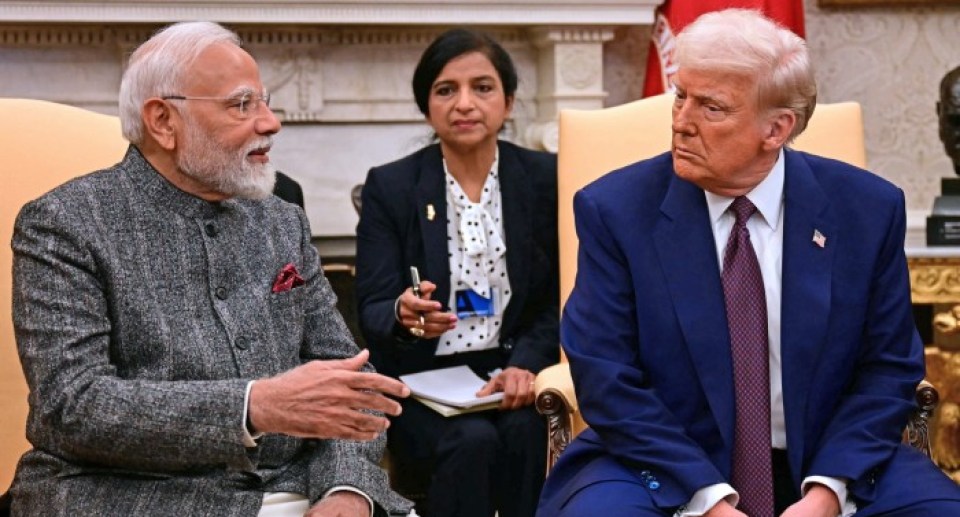Donald Trump offers to mediate as India-Pakistan conflict spirals

[ad_1]
Donald Trump’s administration is pushing to prevent Indian missile strikes against Pakistan from spiralling into a nuclear stand-off, offering to mediate in what is the first big international crisis to erupt since the inauguration.
The US president said he hoped “they can stop now”.
“If I can do anything to help, I will be there,” he said on Wednesday. “My position is I get along with both, I know both very well and I want to see them work it out.”
India and Pakistan face their worst clash in more than two decades, after New Delhi struck what it called “terrorist infrastructure” sites and Islamabad said it shot down Indian aircraft and promised to retaliate for the missile strike.
Pakistan’s armed forces spokesperson Ahmed Sharif Chaudhry said on Thursday that the country’s air defences shot down 25 Indian drones near several cities — including major urban centres Karachi and Lahore — that had killed one civilian and injured four soldiers, bringing the toll in Pakistan this week to 32 killed and 61 injured.
He called the alleged drone attack “yet another blatant military act of aggression against Pakistan”. Indian officials did not reply to a request for comment.
Meanwhile, retaliatory strikes on Wednesday by the Pakistani military on the Indian side of the Line of Control, the de facto border in Kashmir, killed 13 civilians and injured 59, Indian officials said on Thursday.
Marco Rubio, US secretary of state, has been in contact with both countries and separately spoke to his Saudi counterpart Prince Faisal bin Farhan al-Saud on Wednesday to discuss how to defuse the conflict.
The EU on Thursday also called for both sides to “exercise restraint” and “desist from further attacks to safeguard civilian lives”, with the bloc’s chief diplomat Kaja Kallas saying Brussels would “work with all parties to de-escalate the situation”.
But while the US has acted as a mediator in previous crises in South Asia, exerting a calming influence that has helped to avert outright war, Washington may be too distracted by Ukraine and Gaza to be able to resolve the India-Pakistan clash, at least in its early stages, analysts said.
Washington’s messaging since the attack has been inconsistent, experts said. The US strongly condemned the trigger for the Indian missile strikes — a terror attack in Pahalgam, in the disputed territory of Kashmir, on April 22 that killed 26 people.
But in the days following the attack, Rubio urged the Indian and Pakistani governments to work together to “de-escalate tensions” and “maintain peace and security in South Asia”.
That did not go down well in New Delhi, said Tanvi Madan, a south Asia expert at the Brookings Institution. “When something like this happens, a call for both sides to de-escalate is seen in India as asking for Indian restraint, and that’s not something the US would expect from, say, Israel after a terror attack,” she said.
Meanwhile, India said that during a May 1 call between US defence secretary Pete Hegseth and his Indian counterpart Rajnath Singh, Washington had “reiterated the strong support of the US government in India’s fight against terrorism” and “supports India’s right to defend itself”.
That suggested a green light for Indian retaliation, said Madan.
Then, three days after the incident, Trump remarked that the two countries would “get it figured out one way or the other”, adding: “There’s great tension between Pakistan and India, but there always has been.”
Moeed Yusuf, senior fellow at Harvard University’s Belfer Center think-tank and Pakistan’s former national security adviser, said Washington’s approach to tensions arising after the April 22 terror attack had been more “hands-off” than in previous crises.
“They may have calculated that someone else would [mediate], and no one did,” said Yusuf. “But there’s no other country but the US that can force India and Pakistan to de-escalate.”
Yusuf said the US had “choreographed diplomatic efforts” to resolve previous disputes between the two countries, with even non-US allies such as Russia and China “falling into line” behind the initiatives. But it was unclear whether the same thing would happen this time around.
The conflict comes as the US is trying to deepen its relationship with India and Pakistan. New Delhi and Washington have an expanding strategic, defence and technology partnership, largely aimed at counterbalancing China, and the two countries are engaged in talks on a bilateral trade agreement aimed at fending off Trump’s threat of a 26 per cent “reciprocal” tariff on Indian goods.
India took pains to keep the US informed about the missile attack. Soon after it struck Pakistan, Ajit Doval, India’s national security adviser, spoke with Rubio and his counterparts in the United Arab Emirates, Saudi Arabia and Japan, according to an Indian government source.
Pakistan has traditionally been a critical buyer of US military hardware and is also a regional security partner, though this role has diminished since the Taliban’s routing of a western-backed government in Afghanistan in 2021.
Muhammad Aurangzeb, Pakistan’s finance minister, told the Financial Times on Wednesday that his country would welcome “any role” the US and other partners could play in mediating tensions with India.
“The US is a very, very important strategic partner,” he said. “We would welcome any of our partners . . . to come in and help being independent arbiters at this point in time.”
Additional reporting by Humza Jilani in Islamabad, Andres Schipani in New Delhi and Henry Foy in Brussels
[ad_2]
Source link









